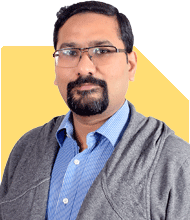Abhishek Shah | Answer |Ask -Follow
HR Expert - Answered on Jul 10, 2023

Sir, i am Ravi working as an accountant in small scall industry. Basically I completed my B com in kannada medium, I am not well in english communication, can i get high salary job? Please advise.
I understand your concern about English language proficiency affecting your job prospects and salary potential. While language skills are certainly important in many industries and job roles, it's not the sole determining factor for securing a high-paying job.
In the field of accounting, proficiency in English can be beneficial, especially when dealing with multinational clients or working in a global organization. However, it's not the only factor that employers consider. Your expertise, experience, and qualifications as an accountant are equally important.
To enhance your job prospects and potentially secure a higher-salary job, I would suggest the following:
Focus on your accounting skills: Continue to develop and refine your accounting expertise. Stay updated with industry trends, regulations, and best practices. Consider pursuing professional certifications like CPA (Certified Public Accountant) or CMA (Certified Management Accountant) to showcase your proficiency.
Gain practical experience: Look for opportunities to gain hands-on experience in accounting, either through internships or by taking on additional responsibilities in your current role. Practical experience can often compensate for any language barriers.
Improve your English communication skills: While it may not be a prerequisite for every accounting job, improving your English communication skills will undoubtedly open more doors for you. Consider enrolling in English language courses or seeking out resources to help you improve your speaking, writing, and listening skills.
Highlight your strengths: Emphasize your expertise in accounting, your attention to detail, and your ability to manage financial data effectively. Showcase any accomplishments or projects where you made a significant impact.
Network and seek opportunities: Engage with professional networks, attend industry events, and connect with individuals who can potentially help you find new job opportunities. Networking can often lead to discovering roles that are suitable for your skills and qualifications.
Remember, in any job application, it's essential to present yourself confidently and highlight your strengths. While language skills are important, they can be improved with time and practice. Focus on showcasing your accounting abilities and continuously working on enhancing your overall professional profile.
Regards,
Abhishek Shah
You may like to see similar questions and answers below
Nitin Sathe | Answer |Ask -Follow
HR, Recruitment Expert - Answered on Mar 17, 2023
Mayank Rautela | Answer |Ask -Follow
HR Expert - Answered on Mar 12, 2023
Aashish Sood |127 Answers |Ask -Follow
CAT, Management Expert - Answered on May 23, 2023
Abhishek Shah | Answer |Ask -Follow
HR Expert - Answered on Jul 04, 2023
Nayagam P P |10849 Answers |Ask -Follow
Career Counsellor - Answered on Aug 14, 2024
Ulhas Joshi |280 Answers |Ask -Follow
Mutual Fund Expert - Answered on Dec 05, 2025
Dr Dipankar Dutta |1835 Answers |Ask -Follow
Tech Careers and Skill Development Expert - Answered on Dec 04, 2025
Ravi Mittal |676 Answers |Ask -Follow
Dating, Relationships Expert - Answered on Dec 04, 2025
Anu Krishna |1745 Answers |Ask -Follow
Relationships Expert, Mind Coach - Answered on Dec 04, 2025
Anu Krishna |1745 Answers |Ask -Follow
Relationships Expert, Mind Coach - Answered on Dec 04, 2025
Mayank Chandel |2562 Answers |Ask -Follow
IIT-JEE, NEET-UG, SAT, CLAT, CA, CS Exam Expert - Answered on Dec 04, 2025
Mayank Chandel |2562 Answers |Ask -Follow
IIT-JEE, NEET-UG, SAT, CLAT, CA, CS Exam Expert - Answered on Dec 04, 2025
Mayank Chandel |2562 Answers |Ask -Follow
IIT-JEE, NEET-UG, SAT, CLAT, CA, CS Exam Expert - Answered on Dec 04, 2025
Mayank Chandel |2562 Answers |Ask -Follow
IIT-JEE, NEET-UG, SAT, CLAT, CA, CS Exam Expert - Answered on Dec 04, 2025
Mayank Chandel |2562 Answers |Ask -Follow
IIT-JEE, NEET-UG, SAT, CLAT, CA, CS Exam Expert - Answered on Dec 04, 2025



























